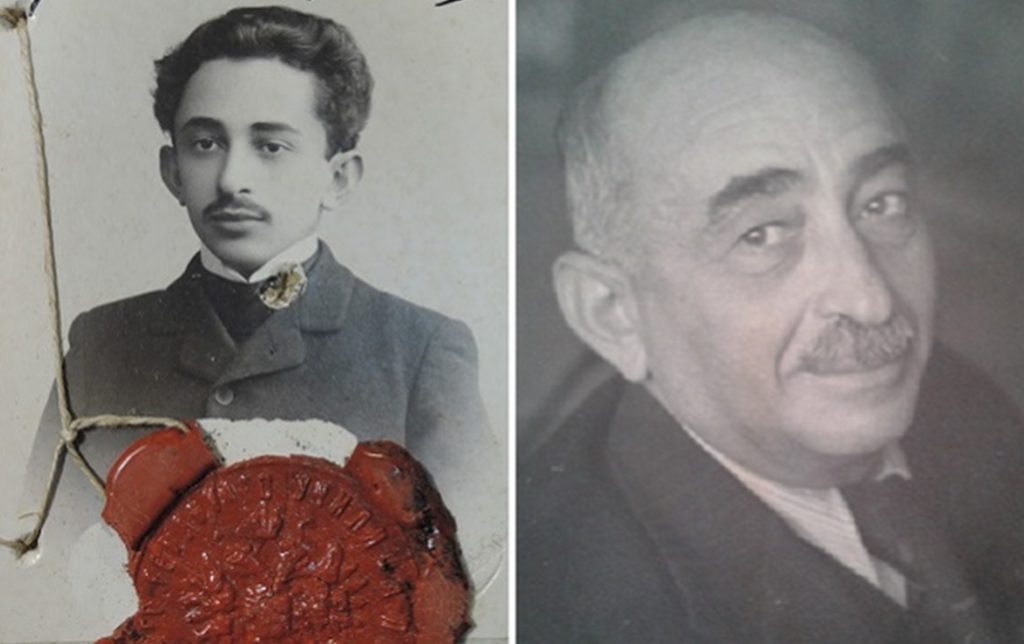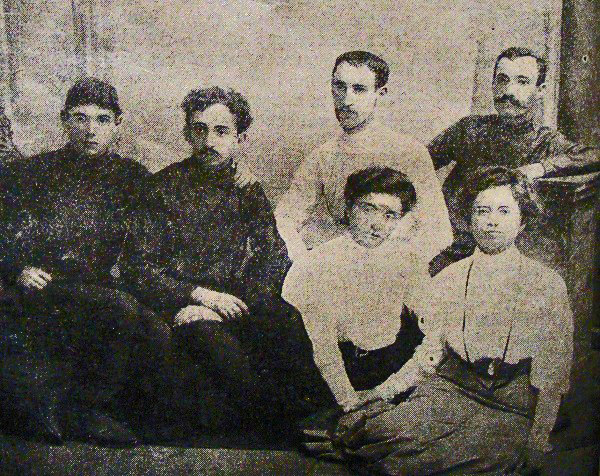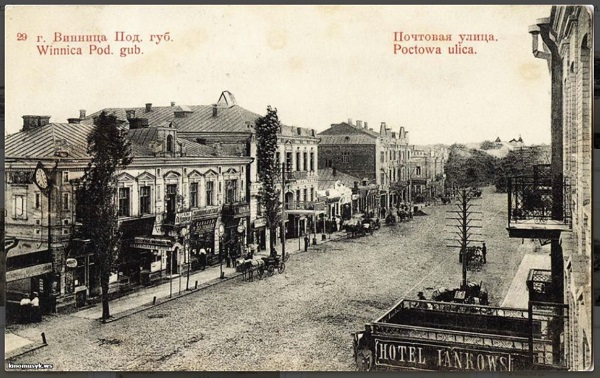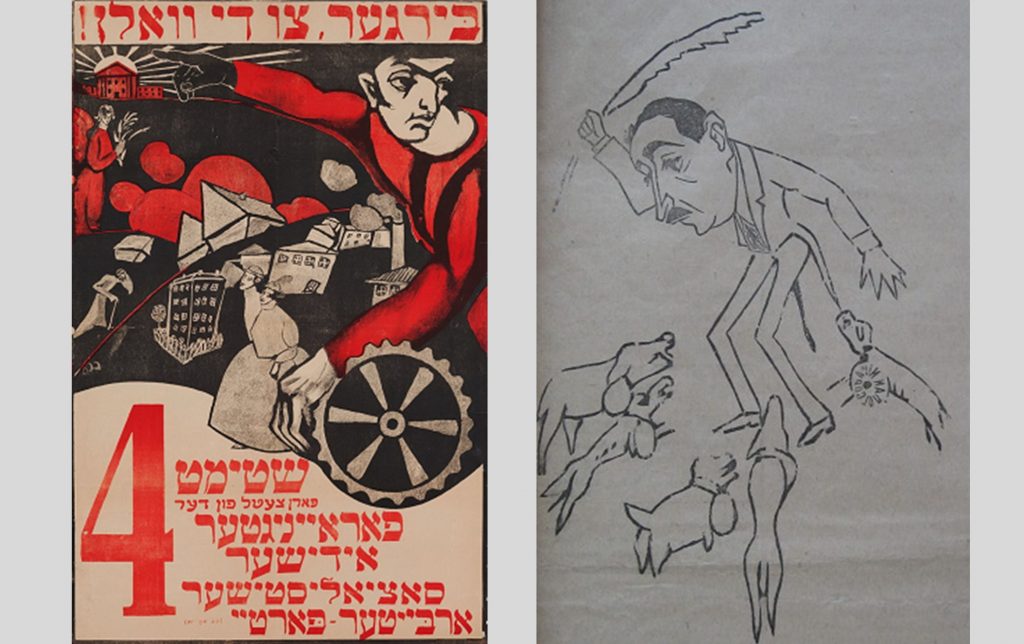Chaim Radbil: How a Jewish socialist became a deputy of the Central Rada

Chaim Radbil was a participant in the two Russian revolutions, a deputy of the Ukrainian Central Rada, counselor of the Vinnytsia Duma, lawyer, publisher, and journalist—an individual of whom his native city of Vinnytsia can be justly proud.
Chaim was born on 14 February 1888. His mother was the daughter of a merchant of the Second Guild, and his father, Beniumin, was a member of the board of the Nemyriv synagogue in Vinnytsia; after 1917 he remained its permanent elder.
Beniumin Radbil was a grain trader and owned a respectable building in the city center (in the “first section,” as people said at the time). Before the October coup [Bolshevik seizure of power in Russia in 1917—Ed] the elderly Radbil owned a house on Velyka Bulvarna Street, which stood opposite the home of General [Aleksei] Brusilov, hero of the First World War.
Chaim had three brothers: Samuil, Avrum, and Moishe. There is an air of mystery surrounding the eldest brother, Samuil, who was a merchant of the First Guild, a “grain man” from Odesa. His activities are described in a terse note published in the newspaper Russkoe slovo on 17 July 1910: “Today, the big grain exporter Radbil, who had obtained huge loans under false bills of lading, disappeared from Odesa. So far, it has been established that Radbil received up to three hundred thousand rubles thanks to false documents.”
After being home-schooled, Chaim successfully passed the external exams of the seven-year Vinnytsia secondary school, after which he began attending courses at the Law Faculty of Imperial Novorossiisk University in Odesa. His classmate, the remarkable poet Don-Aminado (real name: Aminodav Peisakhovych Shpoliansky), penned a sarcastic description of the joyless atmosphere that reigned in this educational institution.
“Novorossiisk University,” wrote Don-Aminado, “was one of the dreariest in the entire empire. And its Law Faculty was even drearier and more incompetent. All those professors lecturing on...state law, political economy, Roman law, criminal law, and all the other types of law—all of them...were gathered by some evil and cunning devil with the sole purpose of immediately putting one off from both studying and the law...”
The young idealist Radbil, who was passionate about ideas of social justice, looked at life with greater optimism than Shpoliansky; studying came easily to him, but he was no recluse. During his student years, Chaim meets a young Odesa woman named Dora Levkova, and they get married in the summer of 1909. In the spring of 1911, Radbil and his wife and daughter return to Vinnytsia, where he starts his law practice as a deputy barrister.
Back in 1905, young Chaim had joined the Vinnytsia branch of the Po‘ale Tsiyon Party, later becoming one of the leaders who broke away from their fellow members and founded a local group called SERP [Jewish Socialist Workers Party—Trans.]. On agrarian questions, this non-Marxist party always solidarized with the SRs [Socialist Revolutionaries]. The members of SERP saw in the Jewish community a base for creating Jewish autonomy headed by a national parliament. After the February Revolution, SERP left the underground and joined the Socialist Zionists, creating the United Jewish Socialist Workers Party, whose mouthpiece in independent Ukraine became the Kyiv-based newspaper Di naye tsayt (The New Times). This newspaper published the writings of a native of the Polish town of Bilgoraj named Israel Joshua Singer, who later became a prominent Jewish novelist; at one time, he was even more famous than his younger brother, Isaac Bashevis Singer.

During a pogrom that took place in Vinnytsia on 20 October 1905, the young Radbil was a member of the self-defense headquarters, and in an essay entitled “Four Days in October” he recounted the massacre of the Jewish self-defense unit by the army and the police.
“When we approached Poshtova Street, from above, troops suddenly began to descend in formation. From the right wing—a middle-aged officer wearing glasses, in front—several civilians with portraits of the tsar.
We were waiting for robbers, but we did not expect them together with troops. The officer stopped the company and looked at us for a minute. The crowd of unarmed boys with bloodshot eyes confused him (sticks were hidden in their sleeves). Then he shouted: ‘Do not dare hurt anyone! We will shoot!’
A few of our youths replied loudly: ‘We will not hurt anyone. A pogrom is not necessary.’
The officer wagged his finger, and the troops marched out. They had just passed when, to our surprise, we saw behind them a huge, motley crowd with stakes and sticks in their hands and with large baskets filled to the brim with something and carefully covered...
Vanka, the son of our neighbor, Domna the washerwoman, my childhood friend, is among them... Our glances met for an instant, then he removes a rock from his pocket and throws it at me, but he misses...
The crowd of pogromists followed the troops; after nearly all of them had passed, a shot rang out from our side. At that moment, as though on command, the mob of robbers turned around...shots rang out behind our backs.
After five minutes, everything went quiet. At the entrance, a young man lay on the staircase at left. He was dead. On the wooden floor sat a deathly pale Jew in a sheepskin jacket .... I knew full well that we had no weapons. After a provocateur fired off the shot, the officer turned the troops and shot us from the back.”
Chaim would later write about one of his fallen comrades: “Avner, a member of the underground, a messenger dispatched from the center. He does not know any other language but the Jewish one, and when he delivers speeches at meetings in synagogues, swaying like a Jew at prayer, his words are imbued with such revolutionary power and faith... He excites people from the podium, and he would have been great on the barricades.”

In 1917 Radbil is elected deputy to the Central Rada from the United Jewish Socialist Workers Party; his name also appears among the candidates to the Russian Constituent Assembly for Podolsk Gubernia. That year Radbil, together with four other Jewish socialist candidates, becomes a counselor of the Vinnytsia Duma. He also manages the organization of elections to the city’s Council of the Jewish Community and oversees the local Jewish theater. On anxious nights when they were waiting for trouble, Radbil, together with other counselors, was on permanent duty, undertaking all possible measures in order to protect Vinnytsia from destruction and devastation.
Fortunately, Radbil did not become a professional revolutionary. His calling, since his youth, was literature. In August 1918 he writes a pamphlet in verse entitled A Meeting of the City Duma, which was published in the second issue of the satirical magazine Krasnyi smekh (Red Laughter), and his Duma Sketches come out in 1919. Friendly, playful humor literally permeates the lines of the pamphlet:
“Counselor Kil, a stout socialist and proud owner of rosy cheeks, a good digestion, and a powerful voice, was in an irreconcilable dispute with the cases and moods of treacherous Russian speech. For the above reason, Mr. Kil preferred to speak in the Duma in the Jewish language, after which the Duma assigned the responsible task of translating Kil’s thoughts to counselors who knew Russian better.”
As soon as the Bolsheviks are mentioned, the tone of the pamphlet changes drastically: Radbil thought of them as muddy scum on the churned-up revolutionary sea.
“Twelve low-browed, acne-prone, pimply apostles of the kingdom of socialism. Twelve workers and soldiers who, in the course of a few months of the revolution, had managed to pick up the tips of socialist doctrine and distort them in their murky brains. The mass of counselors from the Bolshevik list drank tea, chewed bread delightedly, sneezed, coughed, spat, wiped themselves on the government tablecloth, blew their noses heroically, applauded their own people, and laughed ironically at the bourgeois orators.”
Radbil’s articles appear in many publications, not to mention the News of the Vinnytsia City Duma, of which he is the editor. During this period he writes the satirical dramas Sobachii zalog (Damn Bail) and Vova-kommunist (Vova the Communist), and gives lectures at the local branch of the Kultur-lige.

He does not abandon his law practice. When the Bolshevik leader Maksymovych is taken prisoner by the Petliurites and is tried, his legal defense is assigned to Israel’s sworn attorneys Slutsky and Radbil. “When I was heading to the front, I was certain that if I were captured by the Ukrainians, I would not remain alive,” the chairman of the revolutionary investigative commission at the Podolsk gubernial revolutionary tribunal declared in court. “But things turned out differently.” After a lengthy and comprehensive investigation into the case of Maksymovych, one of the principal initiators of the Red terror in Vinnytsia, he was sentenced to death. However, the Bolshevik was pardoned by the Supreme Otaman of the Ukrainian National Republic Symon Petliura. Maksymovych was shot in late 1919 by the Denikinists.
When he was still in Kyiv, working in the Central Rada, Radbil becomes acquainted with the Jewish poet and member of the Kultur-lige Dovid Hofshteyn. Keenly aware of his connection with Jewry, Radbil had poetic talents and wanted to convey to readers images of contemporary Jewish literature. His collection Some New Jewish Poets, which contains his translations from the Yiddish of poems by Hofshteyn, Markish, Halpern, and Kvitko, is published in 1928.
Of course, the former deputy of the Ukrainian parliament and counselor of the Vinnytsia Duma, who had spoken most unfavorably of the Bolsheviks in the press during the Rada and Directory periods, was a suspect person in the eyes of the Soviets. The poems of the Yiddish poets whom he had translated were soon banned, and the end of the NEP [New Economic Policy, a temporary reintroduction of private ownership from 1921 to 1928—Ed.] signalled the termination of Radbil’s publishing activities. Moreover, under his belt was his membership in Po‘ale Tsiyon, a party that the Bolsheviks abolished in 1928.
The lawyer realizes that it is not worth tempting fate, and at the end of 1929, he moves to Leningrad, where, as Chaim Beniuminovich, he finds work as a legal consultant in a construction trust. There, Rachel appears in his life, a friend from his youth in Vinnytsia. They marry after his divorce from Dora Levkova.
Their daughter, Ella, is born in 1933, and shortly afterward, the Radbils obtain a room in a communal apartment on 27 Tavricheskaia Street. It is interesting that before the revolution, the Union of the Archangel Michael, under the chairmanship of Novorossiisk University graduate Vladimir Purishkevich, was located in this building. The Radbil family will reside in the apartment on Tavricheskaia until February 1942, that is, until their evacuation to Tashkent. After returning, Radbil works at a legal consultancy firm located at 74 Liteiny.
During the years of the struggle against cosmopolitanism [a Soviet government campaign against the Jewish intelligentsia in the late 1940s—Ed.], Radbil is expelled from the Collegium of Advocates and is dismissed from his job. He destroys the majority of his personal archive—poems, memoirs, and essays—retaining only the book Some New Jewish Poets and a fairy tale that he wrote for his grandson back in Tashkent. A few months later, he has his first stroke; as a result of a second one, in March 1956, Beniuminovich dies.
The Twentieth Party Congress had just ended, the period of the Thaw began. A civil memorial service was held in the Radbil’s apartment; the large room filled up quickly, with people flocking in the entire time.
“My grandfather was an avid Pushkinist and bibliophile, and he had a wonderful library,” recalls Radbil’s grandson, Aleksandr Shvalbaum. “It had everything: the academic edition of Pushkin, and Goethe’s Faust, and an old album about the life of Emperor Paul, and a book about the history of the MKhAT [Moscow Art Theater], not to mention magnificent albums of paintings.”
Aleksandr also remembers well Rashel Lvovna Radbil, who was a nice, intelligent woman. After his second stroke, Radbil was left paralyzed, and Rashel had to sell nearly his entire library in order to pay for a nurse, with whom she and her daughter took turns sitting at the sick man’s bedside.
During the perestroika years, the Collegium of Advocates gave Aleksandr Borisovich his grandfather’s personal file that he saw fit to pass on to Ella Radbil. When Ella Efimovna died, the Radbil file disappeared into oblivion. But if it is ever found, we will definitely learn much more about this remarkable individual.
Chaim Beniuminovich Radbil did much for his native city. It is possible that one fine day in Vinnytsia a commemorative plaque will be installed in his honor at 2 Artynov Street. He deserves it.
Elena Tsvelik, SPECIAL to Hadashot
Originally appeared in Russian @Hadashot.
Translated from the Russian by Marta D. Olynyk.
Edited by Peter Bejger.



















